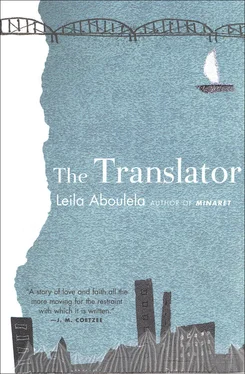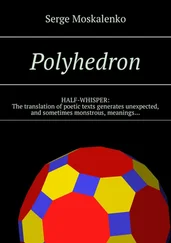‘You’re not old,’ said Nahla. ‘Haven’t you seen Hanan?’ Nahla puffed out her cheeks and did an exaggerated waddle from one side of the pool to the other.
Sammar laughed, looking to check that Dalia hadn’t noticed they were speaking about her mother. It was true though. Hanan did look matronly and walked as if she was still pregnant. ‘It’s just because of the baby,’ she said, putting down the hose to water the flower beds. ‘She’ll become slim soon especially now she is back to work.’ Hanan was a dentist.
‘She was like that even before the baby, you didn’t see her. No, you look years younger than her.’
Sammar took off her glasses. The sunlight was startling white, ruthless. She wiped water off the lenses with the hem of her blouse. Compliments on her looks hardened her inside. What was the use?
‘How’s your mother now?’ she asked. Nahla’s mother was ill with malaria. Yesterday Sammar and Mahasen had gone to visit her.
‘Al hamdulillah, she’s up today. Lots better. But I’m afraid all the preparations for the wedding will tire her,’ she kicked the water, made little waves. ‘Our luck isn’t very good.’
‘Why not?’
‘The Syrian club is booked on the day we want.’
‘Try another club.’
‘The Syrian is the best, so we might change the date.’ Nahla bent down and started playing with the twins’ cups and beakers, showing them how to pour from one to the other.
‘I haven’t been to a wedding for ages,’ said Sammar. ‘Yours will be the first.’
‘Didn’t you go to weddings in Scotland?’
‘No.’
Nahla looked at her with wide, kohl-rimmed eyes, ‘Why not?’
‘I didn’t know many people there. Sometimes I saw wedding couples outside churches having their photographs taken. They don’t get married like us at home. They get married in church or…’
‘Yes, I’ve seen them in films.’ Nahla didn’t seem interested in how people got married in other parts of the world, ‘I hope your aunt Mahasen will come to my wedding.’
‘I don’t know. Has she been going to weddings?’
‘No, not since Tarig,’ Nahla paused, ‘Allah, have mercy on him.’
‘Allah, have mercy on him,’ Sammar repeated. ‘Even if Aunt Mahasen doesn’t go to the party at the club she’ll come to the agid at your house.’
Nahla stepped out of the pool splashing her sandals with water. Pretty ankles, painted toenails, all the preparations for a bride. Sammar was like that once, years ago, years ago before Scotland, before Tarig died.
Here in this house, in this language and this place, were all the memories. All that had been taken away from her. A photograph of Tarig when she had walked into the house for the first time. Smiling, sitting back in a chair, at ease with everything. So young. So young and confident compared to her. He did not know her anymore. The young man in the photograph did not know the Sammar who had lived alone in Aberdeen. The photograph made her cry, tears coming from the fatigue of the journey, the strain of the past weeks in Egypt, the excitement of seeing Amir again, and he so cool, accepting her hugs and kisses as he would from the many visitors and relations who crossed his life. When she cried her aunt and Hanan started to cry. Hanan feeding the baby, sniffing into a tissue, Mahasen still and straight-backed, her tears falling without her face crumpling, without the indignity of sobbing. Only after they had cried together did the awkwardness of their meeting begin to break, the years she was away. Only then was it as if reaffirmed that she was who she was, Amir’s mother, Tarig’s widow coming home.
She walked Nahla to the gate, then it was time to get the children out of the pool, take them indoors, give them showers. The bathroom was so hot that she dripped with sweat while they dripped with water. Soap and squeals. ‘You put soap in my eyes!’, screams, guilt, Hassan’s blood-shot accusing eye, his slippery arm beating against her skirt, ‘Bad Sammar, ugly Sammar.’
Talcum powder and fresh clothes. ‘I’m not wearing this,’ Dalia folded her arms across her chest with all the authority of her mother.
‘Why not, it’s lovely. This is a lovely rabbit.’
‘It’s ugly.’
‘Amir, do you think it’s ugly?’
‘No.’
‘See, Amir thinks it’s lovely and Mama when she wakes up will think it’s lovely and Grandma Mahasen…’
‘I want to wear the red one.’
‘The red one is in the washing; it’s dirty.’
‘I want the red one.’
‘You can’t wear the red shirt. Wear the rabbit one and I’ll take you out with me and Amir this evening.’
‘Where are you going?’
Sammar pulled the rabbit T-shirt over Dalia’s head. There was no resistance. The child pushed her arms through the sleeves and looked at Sammar expectantly.
‘We’re going to Uncle Waleed’s house.’
Dalia frowned. She could not remember who Uncle Waleed was.
‘My brother,’ said Sammar. ‘Remember, they have a balcony with birds in a cage.’ She smoothed Dalia’s eyebrows, ruffled by water and the neck of the T-shirt. ‘Let’s get out of this heat,’ she said and pulled the bathroom door open, glad to get out of the stuffiness into the coolness of the hall.
The hall led to the sitting room, where the television and the big air cooler was. There was two beds along the wall and three old armchairs. There were stools for the children to sit on and a low circular coffee table made of light wood, which wobbled and swayed but still served as a dinner table, and for the homework Amir and Dalia did every afternoon. The house had another sitting room, the sallown as everyone called it. It was for formal guests, a lifeless room, not for everyday use. Sammar had received some of her friends there when they had come to welcome her back. She had sat with them conscious of a wedding photograph of her and Tarig, she as a bride looking ignorant and young. ‘Don’t you think it is better to take down that photograph from the sallown?’ she had asked her aunt and was answered with a look of suspicion, a quick no. And Mahasen must have complained to Hanan, for the next day Hanan said, ‘My mother still can’t get over it. Sammar, please, for Allah’s sake, don’t annoy her. He was her only son.’
Her only son. It was like that from the day she had brought Tarig home, carried in an airplane, in a box. Her only son. The words on everyone’s lips, said in disbelief, Mahasen’s son died, Mahasen’s son died. Her only son. He left an orphan. Poor orphan. My heart is breaking over this orphan boy. My heart is breaking over Mahasen, her only son. It was like that from the day Sammar brought Tarig home from Aberdeen and she the one who was carrying failure, her life ripped, totally changed, losing aim, losing focus, while Mahasen and Hanan went on as before and Amir could not miss the father he could not remember.
In the sitting room, her aunt was awake but the baby was still asleep on the bed between the wall and Mahasen’s back. In spite of the grief that had aged her aunt’s face, there was still an elegance about her, something refined in the way she sat and the way she talked. She was watching a video with the children. A cat chased a mouse on the screen, forever frustrated, forever unfulfilled. Sammar greeted her aunt and sat on one of the stools to comb Dalia’s hair. If she didn’t comb it and braid it now while it was wet, it would frizz up and be impossible to untangle. The wide-toothed comb was slippery in her hands. ‘Aw,’ said Dalia, her concentration still on the screen.
‘Sorry, pretty one. I’m nearly finished. Do you want two braids or one?’
‘Two.’
Mahasen said, ‘Two suits her better. Tighten them, last time you made them too loose and they didn’t last.’
Читать дальше












